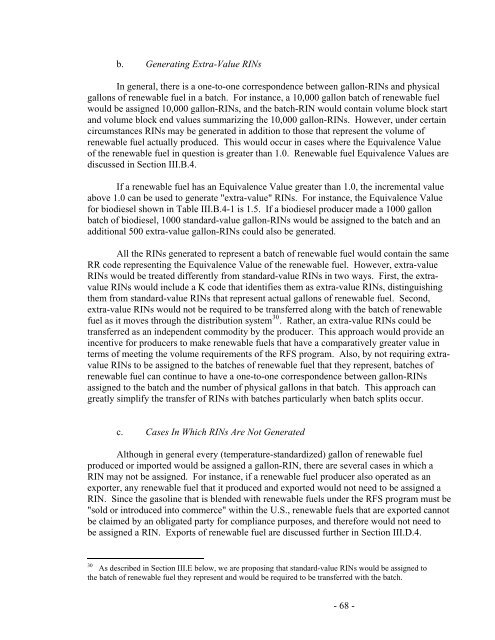Regulation of Fuels and Fuel Additives: Renewable Fuel Standard ...
Regulation of Fuels and Fuel Additives: Renewable Fuel Standard ...
Regulation of Fuels and Fuel Additives: Renewable Fuel Standard ...
You also want an ePaper? Increase the reach of your titles
YUMPU automatically turns print PDFs into web optimized ePapers that Google loves.
. Generating Extra-Value RINs<br />
In general, there is a one-to-one correspondence between gallon-RINs <strong>and</strong> physical<br />
gallons <strong>of</strong> renewable fuel in a batch. For instance, a 10,000 gallon batch <strong>of</strong> renewable fuel<br />
would be assigned 10,000 gallon-RINs, <strong>and</strong> the batch-RIN would contain volume block start<br />
<strong>and</strong> volume block end values summarizing the 10,000 gallon-RINs. However, under certain<br />
circumstances RINs may be generated in addition to those that represent the volume <strong>of</strong><br />
renewable fuel actually produced. This would occur in cases where the Equivalence Value<br />
<strong>of</strong> the renewable fuel in question is greater than 1.0. <strong>Renewable</strong> fuel Equivalence Values are<br />
discussed in Section III.B.4.<br />
If a renewable fuel has an Equivalence Value greater than 1.0, the incremental value<br />
above 1.0 can be used to generate "extra-value" RINs. For instance, the Equivalence Value<br />
for biodiesel shown in Table III.B.4-1 is 1.5. If a biodiesel producer made a 1000 gallon<br />
batch <strong>of</strong> biodiesel, 1000 st<strong>and</strong>ard-value gallon-RINs would be assigned to the batch <strong>and</strong> an<br />
additional 500 extra-value gallon-RINs could also be generated.<br />
All the RINs generated to represent a batch <strong>of</strong> renewable fuel would contain the same<br />
RR code representing the Equivalence Value <strong>of</strong> the renewable fuel. However, extra-value<br />
RINs would be treated differently from st<strong>and</strong>ard-value RINs in two ways. First, the extravalue<br />
RINs would include a K code that identifies them as extra-value RINs, distinguishing<br />
them from st<strong>and</strong>ard-value RINs that represent actual gallons <strong>of</strong> renewable fuel. Second,<br />
extra-value RINs would not be required to be transferred along with the batch <strong>of</strong> renewable<br />
fuel as it moves through the distribution system 30 . Rather, an extra-value RINs could be<br />
transferred as an independent commodity by the producer. This approach would provide an<br />
incentive for producers to make renewable fuels that have a comparatively greater value in<br />
terms <strong>of</strong> meeting the volume requirements <strong>of</strong> the RFS program. Also, by not requiring extravalue<br />
RINs to be assigned to the batches <strong>of</strong> renewable fuel that they represent, batches <strong>of</strong><br />
renewable fuel can continue to have a one-to-one correspondence between gallon-RINs<br />
assigned to the batch <strong>and</strong> the number <strong>of</strong> physical gallons in that batch. This approach can<br />
greatly simplify the transfer <strong>of</strong> RINs with batches particularly when batch splits occur.<br />
c. Cases In Which RINs Are Not Generated<br />
Although in general every (temperature-st<strong>and</strong>ardized) gallon <strong>of</strong> renewable fuel<br />
produced or imported would be assigned a gallon-RIN, there are several cases in which a<br />
RIN may not be assigned. For instance, if a renewable fuel producer also operated as an<br />
exporter, any renewable fuel that it produced <strong>and</strong> exported would not need to be assigned a<br />
RIN. Since the gasoline that is blended with renewable fuels under the RFS program must be<br />
"sold or introduced into commerce" within the U.S., renewable fuels that are exported cannot<br />
be claimed by an obligated party for compliance purposes, <strong>and</strong> therefore would not need to<br />
be assigned a RIN. Exports <strong>of</strong> renewable fuel are discussed further in Section III.D.4.<br />
30 As described in Section III.E below, we are proposing that st<strong>and</strong>ard-value RINs would be assigned to<br />
the batch <strong>of</strong> renewable fuel they represent <strong>and</strong> would be required to be transferred with the batch.<br />
- 68 -
















